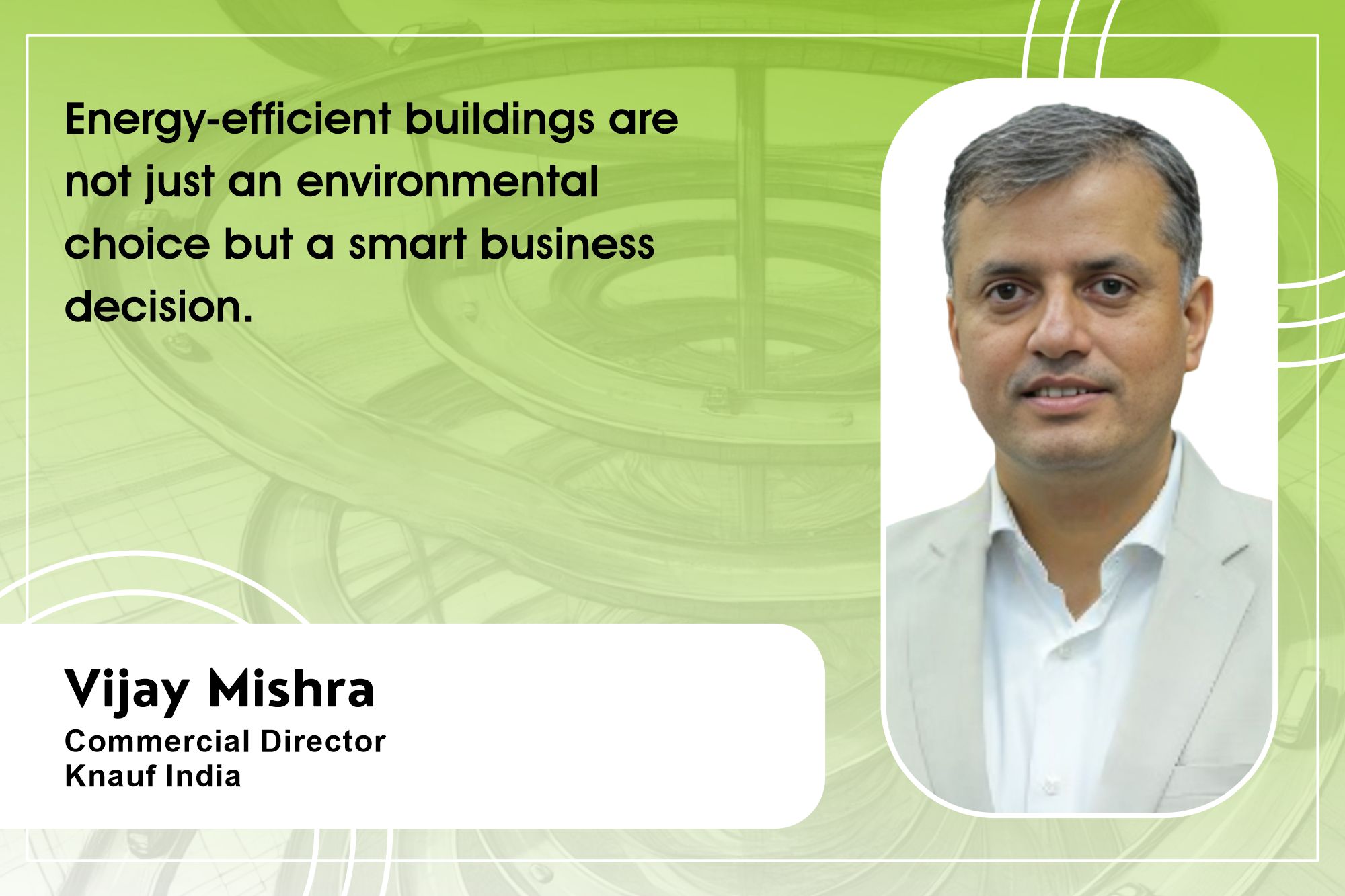Knauf India’s vision for smart and eco-friendly buildings
By Staff Report | April 17, 2025 5:58 pm SHARE

Knauf India provides innovative, resource-efficient plasterboard systems, ceilings and building materials to promote sustainable construction. With a strong emphasis on decreasing energy and water use, the company is influencing the future of eco-friendly infrastructure in India.
What key factors drive the shift towards sustainable construction in the country? How does Knauf India contribute to the development of green building projects?
Over the last few years, the concept of sustainability in construction has grown louder in India. People have become more aware of the environmental impact caused by buildings. Rising temperatures, higher electricity bills, and growing pollution have pushed developers and homeowners to consider greener options.
There is an increasing demand for buildings that are energy efficient, safe to live in, and simple to maintain. Government authorities and green building councils urge developers to use environmentally friendly solutions.
At Knauf India, sustainability is a core part of our work. Our drywall systems, ceilings, and other products use fewer natural resources, produce less waste, and help save energy. They also reduce on-site pollution and noise, which speeds up the construction process. We are proud that our solutions meet the standards of many green building rating systems. We are focused on reducing energy and water use across our manufacturing units.
What major challenges are faced while introducing new construction materials in the Indian market?
The Indian construction industry is growing fast, but introducing new materials has challenges. One of the primary issues is changing mindsets. Many builders, contractors, and engineers are used to older methods while often hesitating to try something new, even if it’s better.
Another challenge is training. Modern materials require various installation techniques, which can result in unsatisfactory results if personnel are not adequately trained to handle them. We must devote time and resources to guiding the market.
India has diverse terrains and climate zones, so transport and delivery can sometimes be difficult. It is important to ensure products reach the right place in good condition. Additionally, getting approvals from different authorities takes time.

We tackle these challenges by offering on-site support and training, working closely with architects, builders, and decision-makers to help them see the value in modern materials.
How do you see economic fluctuations affecting the construction industry in India?
As the construction industry is linked to the economy, more projects are launched, and people invest in homes and commercial spaces when the economy is strong; however, when the economy slows down, construction activities also take a hit.
During such times, budgets become tighter, and developers look for ways to cut costs. Material prices may go up due to supply chain issues, which affect planning and timelines, and some projects may get delayed or even put on hold.
That said, India is still one of the fastest-growing markets. The demand for housing, roads, hospitals, and schools continues to rise. So, even during tough times, companies that offer value-driven and cost-effective solutions always have opportunities.
We focus on making construction faster and more efficient. Our tools assist developers in saving time and labour, which is a significant advantage when striving to minimise expenses.
What sustainable practices are being increasingly adopted by Indian construction companies?
More builders and developers are choosing greener building methods across the country. For example, many use dry construction methods to reduce water use. Some are adding solar panels to rooftops or using smart lighting to save energy.
There’s also a focus on reducing waste. Builders are planning better so that fewer materials are thrown away. Some projects are reusing waste materials to lower their environmental impact. Rainwater harvesting, natural ventilation, and improved insulation are becoming more common.
These changes are good for the planet and good for business. Buildings that use less energy and water are cheaper to run long-term. We are glad to support this shift with energy-saving, low-waste, and future-ready products.
What role do regulatory policies and certifications play in driving sustainable construction?
Rules and certifications contribute immensely to accelerating the construction industry’s progress. They act like guides, helping developers know what standards to meet. When the government sets clear goals or offers benefits for green construction, it encourages more people to follow those practices.
Certifications from trusted organisations also help, as they give projects a stamp of approval, which builds trust among buyers and investors. These certifications show that the building is safe, efficient, and built with care for the environment.
We work hard to ensure that our materials support these efforts. Our products meet the requirements for many green building systems, and we discuss them with policymakers and industry leaders to help shape the future of sustainable construction in India.
How will digital adoption evolve in the construction industry in the next 5 years?
The way we build is evolving, and digital technologies are playing a significant role in this transformation. Over the next five years, India’s building industry will become considerably more technologically advanced. Builders will utilise digital models to plan projects more precisely. This will allow them to prevent delays and reduce waste.
We also anticipate more use of systems that track work in real time. This means greater control over quality and timeliness. Some sites currently use mobile apps, drones, and sensors, and this trend is expected to increase.
Digital adoption will also help train workers and improve site safety. For example, virtual tools can show how a system should be installed, making it easier for workers to learn quickly and avoid mistakes.
At Knauf India, we are ready for this change. We offer digital libraries of our products, support Building Information Modeling, and provide online training for our partners. Technology will bring everyone better results, faster delivery, and smarter buildings.
For more information, visit: https://knauf.com/en
Cookie Consent
We use cookies to personalize your experience. By continuing to visit this website you agree to our Terms & Conditions, Privacy Policy and Cookie Policy.




































-20240213125207.png)

























